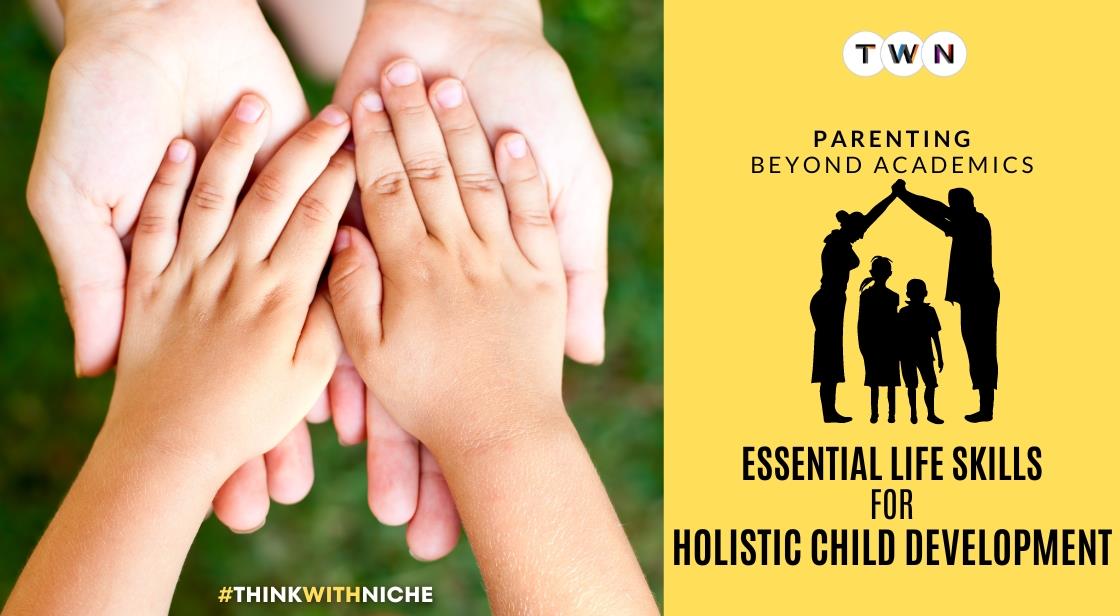Parenting Beyond Academics: Essential Life Skills for Holistic Child Development

Blog Post
Dive into the world of effective parenting with our comprehensive guide on teaching your child the crucial life skills for a successful, happy future. From emotional intelligence to financial literacy, discover how to prepare your child to thrive in an ever-evolving world.
Parenting is akin to artistry, requiring a blend of intuition, love, and strategic planning to sculpt the young minds of our children into confident, capable adults ready to face the world's complexities.
As the global landscape evolves at an unprecedented pace, relying solely on academic achievements falls short of preparing our offspring for the myriad challenges of adult life.
Empowering the Next Generation: Discover The Essential Life Skills Every Child Needs
This blog dives deep into the essential life skills- ranging from emotional intelligence to financial literacy- that are pivotal for laying a robust foundation for our children's future prosperity, happiness, and resilience.
The Bond - Parents and Children, Its Importance
The relationship between parents and children is fundamental, serving as the bedrock upon which all developmental skills are built.
It's within the safety and support of this bond that children learn to navigate their emotions, solve problems, and interact with the world.
The Foundation Blocks of Effective Parenting
Effective parenting goes beyond providing for the basic needs of our children.
It involves equipping them with a comprehensive skill set that encompasses emotional, intellectual, and practical competencies essential for holistic development.
Key Skills for a Successful Future of Our Children
We have covered this section in a question-and-answer format for better understanding:
Question #1
How to Teach Your Child Emotional Intelligence?
Emotional intelligence (EI) is the ability to understand and manage one's emotions and to empathize with others.
Teaching your child EI is a critical aspect of their development, enabling them to build healthy relationships, make informed decisions, and navigate the complexities of social interactions.
Strategies to Teach EI to Children
Model Emotional Intelligence: Children learn by watching their parents.
Healthily express your emotions, show empathy towards others, and talk about your feelings openly.
Name Emotions: Help your child identify and name their emotions.
Use books or storytelling as a tool to discuss different feelings and appropriate responses.
Practice Problem-Solving: When your child is upset, guide them through the process of identifying the problem, brainstorming solutions, and choosing a course of action. This helps them understand that emotions are manageable.
Encourage Empathy: Discuss scenarios that require empathy.
Ask questions like, "How do you think they felt?" to encourage your child to put themselves in someone else's shoes.
Emotion Regulation Techniques: Teach your child techniques to manage overwhelming emotions, such as deep breathing, counting to ten, or using words to express how they feel.
Readers can further explore the Yale Center for Emotional Intelligence’s Link http://ei.yale.edu which explains how it offers strategies and tools for parents to teach emotional awareness and regulation.
Question #2
What are the Strategies for Improving Problem-Solving Skills in Children?
Problem-solving skills are essential for children to become independent and capable adults.
These skills empower them to face and overcome challenges both in school and in life.
Strategies to Enhance Problem-Solving Skills
Encourage Questions: Foster a curious mindset by encouraging your child to ask questions.
This stimulates their thinking process and enhances their investigative skills.
Use Games and Puzzles: Games that require strategic thinking or puzzles that need solving can be fun, engaging ways to build problem-solving skills.
Real-Life Problems: Involve your child in solving real-life problems.
For example, if you’re planning a family meal, ask your child to help you figure out the ingredients needed or the cooking time.
Teach Decision-Making: Present your child with choices and let them make decisions.
Discuss the pros and cons of each option to guide their thought process.
Reflect on Outcomes: After a problem is solved, discuss the outcome with your child.
Talk about what worked, what didn’t, and how they can approach a similar problem in the future differently.
Question #3
Importance of Communication Skills for Children's Success
Effective communication is pivotal for success in almost every aspect of life.
For children, developing strong communication skills early on helps them express their thoughts and emotions clearly, build relationships, and navigate social situations.
Enhancing Communication Skills in Children
Engage in Active Listening: Show your child how to listen actively by giving them your full attention when they speak, nodding, and asking follow-up questions.
This teaches them the value of listening in communication.
Expand Vocabulary: Introduce new words during everyday activities.
Reading together is a great way to enhance your child’s vocabulary and improve their communication skills.
Encourage Expression: Encourage your child to talk about their day, how they feel, and what interests them.
This practice helps them become comfortable articulating their thoughts and feelings.
Practice Non-Verbal Communication: Teach your child about body language and facial expressions.
Understanding non-verbal cues is a critical component of effective communication.
Role-Playing: Use role-playing games to practice conversations, especially for potentially challenging interactions.
This can prepare them for real-life situations.
Question #4
How to Instill Financial Literacy in Young Children?
Financial literacy is crucial for managing money effectively.
Teaching your child the basics of financial management can set them up for a life of financial responsibility.
Strategies to Teach Financial Literacy to Kids
Use a Piggy Bank: A simple piggy bank can teach children about saving.
Encourage them to save money for something they want, demonstrating the value of patience and planning.
Play Money-Based Games: Games like Monopoly can introduce concepts of money management, investing, and budgeting engagingly.
Earn and Spend: Allow your child to earn money through chores.
This teaches them the effort required to earn money and helps them understand spending decisions.
Open a Savings Account: Opening a savings account for your child can be a practical introduction to banking.
It gives them a sense of ownership and responsibility.
Discuss Wants Vs. Needs: Help your child differentiate between wants and needs. This concept is fundamental in budgeting and managing finances effectively.
Readers can further explore topics covering financial literacy, by following the link https://www.mymoney.gov as it highlights teaching kids about money management.
Question #5
What are the Top 5 Tips for Teaching Time Management to Kids?
Time management is a skill that benefits children throughout their lives, helping them meet responsibilities and enjoy free time.
Top Five Tips for Teaching Time Management to Children
-
Create a Visual Schedule: Use charts or calendars to plan out the day or week.
Visual aids help children understand how their time is allocated. -
Set Priorities: Teach your child to distinguish between high-priority tasks and less critical activities.
This helps them tackle important tasks first. -
Use Timers: Timers can make time management a more tangible concept for children.
They can be used for homework, chores, and playtime. -
Break Tasks into Smaller Steps: Large tasks can seem overwhelming.
Teach your child to break tasks into manageable steps and to allocate time to each. -
Lead by Example: Children learn from their parents.
Show them how you manage your time, how you prioritize tasks, and how you balance work and play.
Fostering Creativity and Physical Well-being
Creativity and Innovation: Encouraging a Creative Mindset
Creativity nurtures innovation and adaptability.
Support your child's creativity by providing diverse experiences, encouraging creative expression through art, music, and play, and valuing their unique ideas.
Physical Activity: Importance of Staying Active and Healthy
Physical well-being is as crucial as mental and emotional health.
Ensure your child stays active through regular physical activities, sports, and family outings that promote a healthy lifestyle.
Implementing Effective Parenting Strategies- Utilizing Resources and Role Modeling
Finding Reliable Parenting Resources
Utilize a wealth of resources available through books, online platforms, and community programs to support your parenting journey and provide additional learning opportunities for your child.
Being a Positive Role Model for Your Child
Role modelling is a powerful tool in teaching children about life's various skills. Exhibit the behaviours and attitudes you wish to instil in your child, from showing resilience in the face of challenges to practising kindness and empathy towards others.
Conclusion: The Journey of Parenting
The journey of parenting is both challenging and profoundly rewarding.
By focusing on these critical skills, you're not only preparing your child for academic success but also a fulfilling, balanced life.
Remember, the goal of effective parenting is to raise well-rounded individuals who are equipped to tackle life's challenges with confidence, empathy, and a lifelong love of learning.
Embrace this journey with open hearts and minds, and watch as your child blossoms into a capable, compassionate adult.
Read these blogs for more on children and parenting:
Effective Involvement Of Children And Young People
After a reaction, Instagram for Kids was put on hold
Creative Ways to Reduce Screen Time and Keep Kids Busy
You May Like
EDITOR’S CHOICE












